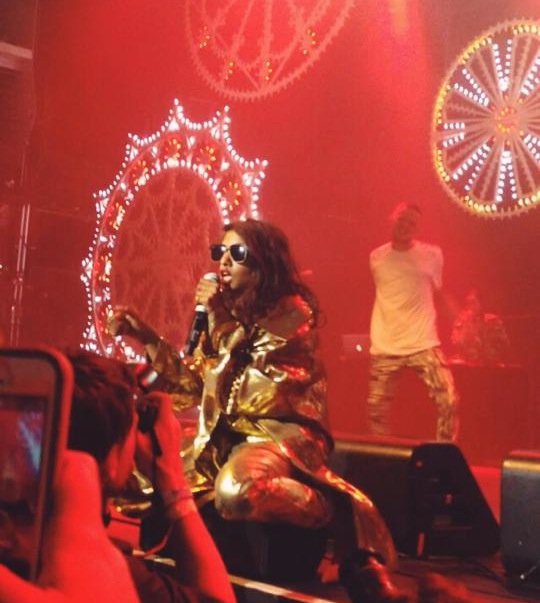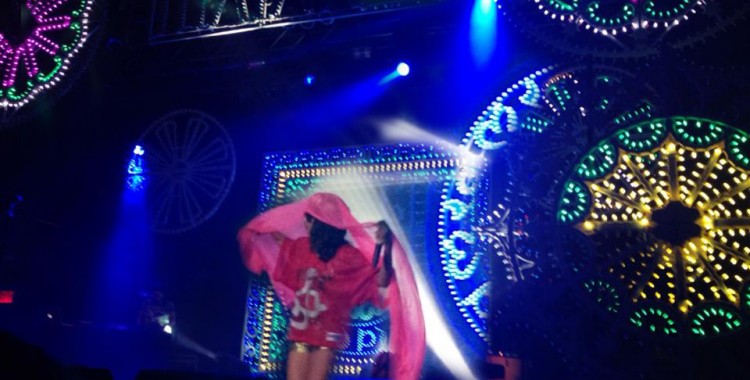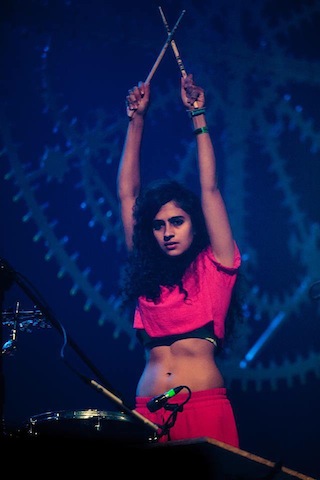M.I.A.’s Global Village Marching to the Tune of Kiran Gandhi’s Drums
For Mathangi “Maya” Arulpragasam, the last year of her life has been under constant public scrutiny. From fighting for the custody of her 4-year-old son, Ikhyd, to dealing with a lawsuit from the NFL for her “middle finger stunt” at the Super Bowl halftime show back in 2012 – Maya still managed to harness her brilliance into her latest album, Matangi. Using Hindu mythology, reggae rhythms, Indian classical drums and vocals, popular club beats, and more than a little brown girl rage as inspiration – Matangi may just be Maya’s best creation yet. The first song I got the chance to listen to was “Boom Skit” beginning with the lyrics: “brown girl, brown girl/ turn your shit down/ you know America don’t wanna hear your sound” – let’s just say I found my new anthem.
Although being able to listen to Matangi on repeat was more than satisfying for me, I was lucky enough to score a ticket to the kickoff show for the Matangi world tour at Terminal 5 in New York City.
Where do I start? I got the heads up through Maya’s twitter account to wear white because this special show was going to be a ‘Holy/Holi Party.’ So on top of getting to be the first audience Maya performed songs from Matangi live for, I got to be showered with Holi powder thrown from the goddess herself. Yeah. That actually happened. Oh, and did I mention that the opening act was Julian Assange, the creator of wikileaks, video chatting live for Maya’s audience from the Ecuador Embassy in London? Needless to say, it was an evening of overwhelming good vibes. Anyways, Maya kept her audience going crazy, playing both her newest songs as well as some songs that were for her, “old school fans.” Backed by an amazing crew consisted of Venus X, the fantastic babe of a DJ and creator of famed ‘GHE20 GOTH1K,’ backup singer Rosaly Pfeffer, drummer Kiran Gandhi, and two fantastic backup dancers – all laced in gold costume jewelry from India and M.I.A.’s new collaboration with Versace- Versus Versace.
What is truly amazing about it was the combination of all aspects of the performance- chanting om and throwing holi powder, to Julian Assange praising M.I.A. and encouraging the audience to be revolutionaries before Venus X hit us with some world beats. It was all a declaration of third world pride; that we are truly multifaceted, lively and brilliant. Terminal 5 was definitely a Global Village.
After the show, I got to catch up with the M.I.A.’s talented, multifaceted, charming drummer, Kiran Gandhi at the house she grew up in, in the Upper East Side of Manhattan. After a crazy past 24 hours in which Maya’s stage entourage had to learn practically a whole new set list, to performing with Maya on the first show of the tour, Kiran came home to family and close friends (including DJ Rekha!) cool, calm, and collected. We stepped into her kitchen for an intimate Browntourage chat:
MEDHA: Thanks for doing this interview! So first, tell me a little about yourself.
KIRAN: I grew up in New York City and went to Chapin School, which is an all women’s school kindergarten-12th grade. Between ’97-2000, I moved to Bombay, India and you know, I analyze a lot about where my feminist values come from and I think about that time I was in Bombay, primarily, because the Spice Girls just had made their way to India and a lot of what I was thinking at that time, because literally I was a second grader, was messages of girl power and you can be anyone you wanna be and ‘if you wanna get with me you have to get with my friends.’ All that stuff really resonated with me and it felt really different. I just drank it in, like everyday I lived and breathe the Spice Girls and everyday I would be a different Spice Girl. I refused to wear my school uniform and instead wear my Spice Girl shirt and Spice Girl backpack, girl power hat. I even had a shirt that had my face on it and it said ‘Kiran, The Ultimate Spice Girl’ and I would wear it to class. So, I always think about what it is that made me who I am today and I really think about that time in my life. I went to Georgetown for my undergrad and I studied Math & Political Science and I did a minor in Women’s Studies and for two years after that I helped start the analytics department at a record label in LA [Interscope]. Now I go to Harvard Business School and tour with M.I.A.
MEDHA: Wow, I bet you get this from your friends– So what’s it like collaborating with M.I.A.? And also, going to school?
KIRAN: I wasn’t expecting to do both at the same time. I got into HBS in March of this year and then I got asked to go on tour in July and sometimes when you’re just given exactly what you want you’re just like… okay! We’re gonna do whatever it takes to protect both of these and work really hard at both of them and make them both work. There are also a lot of things that have happened that have allowed for this to exist. And then your first question, how’s it like to collaborate with M.I.A right? Actually, it has been amazing. In the beginning, she used to really kick my ass and she used to sort of push me to this level that I just wasn’t used to playing at. For example when I was by myself practicing, there’s this intro to this one song “Born Free,” and I remember being at my rehearsal studio in LA before I had even gotten to the tour, and I was thinking there was no way she’s gonna make me play that shit live, no chance. Then I got there, and she’s like, “great, so do you know the intro yet?” And I was like…. Oh my god, there’s no way. So I just remember being in the hotel room and playing it slowly, tryna make the tempo slow in the track so I could learn it perfectly. And now we play it live with the track in my ear that I’m playing live to the audience and now we have that for a couple new songs, we have that for – Warriors, Sunshowers, just sort of moments with the drums having like a lead role. And working with M.I.A. has been amazing, because she pushes me to get those perfectly as opposed to being like ‘yeah whatever, it’s fine.’ You know?
MEDHA: What do you kind of do as self-care to make yourself get through all of this and not feel overwhelmed all the time?
KIRAN: I hang out. Like I really love to just hang out. I love to hangout with people who always inspire me. So at HBS, especially, because a lot of people there are achieving so many different things, one thing I love is to exchange ideas with a small group of people. I hate big parties where you can’t talk to anyone and everyone’s messed up and all in your face about it… I don’t like that stuff. I love just three, four people who I think are really cool people and we just have one or two beers together or wine and go to a cool place in Boston, or shisha lounge, and just like…who are you? Do you agree? You know, we’ll just talk about things that matter to me, for example, like feminism and pornography and just like weird things that I like and just kinda see where they’re at with it. I live for these conversations.
MEDHA: Feminism and pornography, huh? So what are your views on feminism and being a brown girl?
KIRAN: I think being a woman of color, actually, when I was younger – I never knew it was a thing. You know they’d be like ‘oh a minority’ and I don’t feel like a minority I feel like I’ve been here at this school in a similar boat as everyone else. For me, I actually feel grateful to look how I do. Because I think it allows me to be a chameleon, sometimes you know when you look unusual, or someone just really doesn’t’ know how to deal with you, then you actually get to be in control of the situation. And that’s something that I’ve realized only later on in my life that I can do and I am very conscious of that. And I think it’s because I’m mixed, my Mom is half–Irish and half-Indian and my Father is Indian and I have this crazy curly hair that no one can figure out where it comes from. So, I think being someone, being a women of color, being brown, being Indian, there’s so many moments I feel blessed that I don’t think people judge me for anything cuz they just don’t know, they haven’t seen much of it. And I think there is actually a leadership element to it, you can actually create people’s biases and perspectives and change how they think and be like, you thought I was this but I’m so not that. You thought I was Harvard Business School but I’m this queer-rad-feminist-drummer-god knows what… And so for me at times, I feel like I’m being-the-change feminist and just living it where someone from afar it can be like, “Whoa! Harvard Business School and drumming! Like never knew that smart people could drum.” People unfortunately think very modularly and it’s up to us to change their perspectives.
There’s something we learn at HBS called inquiry versus advocacy, and this is something that I’m really working on. Because before, I always used to just advocate… this is how things should be, this is how you should think, and you’re sexist why don’t you think like this, you know blah blah blah, but then people put up a wall. They get angry, they get defensive, so instead, what we have to do is inquiry…. Why do you think this way? Why do you think that when people refer to CEOs, they by nature, say he? Why is that? Why do you think they do that? And then you let people uncover their own biases like ‘oh, I see what you’re trying to do there.’
MEDHA: In general, who do you look up to? For instance, why did you get into drumming?
KIRAN: Well, one thing I really don’t like is boundaries. Like when people say ‘oh you must choose this major, you must choose this activity, are you going to be a professional drummer? Or are you going to go to school? Are you a Math person, what’s your story?’ For me, that was confusing. Because I like mathematics, I like leadership, I like politics, I love feminism, I love music, so for me it was like how do I tie this all together? And for me, they are all very closely linked. I think drumming, by nature, is a masculine activity and so then when you see a woman drumming, I’d like to think that you’ve altered someone’s world in that moment just by him or her seeing that. And through that, you can also uplift others around you. In the same way that, Maya (M.I.A.), brought me on as a woman musician…people see that, see her as a leader, and can see that she has all these amazing women around her and that she only really trusts women or whatever you know… and that’s really cool. In terms of people I look up to, I mean I obviously really do look up to Maya. Because every time I hear a lyric… I am just like, god you are so on. That’s exactly right. You’re so on point. And she buries it rhythmically, so if you want to tune into the politics, you can. And if you don’t want to… you can just sit there and just be like Y.A.L.A. and whatever, you don’t have to think twice about it. That is very, very intelligent.
MEDHA: I love that about her! Okay, one last question. Very random fun question, if you were a piece of art, real or fake, what would you be?
KIRAN: I think one thing that was inspiring was when I saw The Knife performing… they did this amazing gender-bending queer sort of performance art. So I think I would want to be part of something like that, We basically push, we use our leverage as artists, because we’ve already gained people’s trust, so they come to our shows, and then you use that attention to really captivate them and say, we’re gonna fuck with you so hard right now and you’re gonna learn something and you’re gonna start questioning your own assumptions of the world. So, if I were a piece of art, I would want it to be some sort of gender-funk performance art that make people question the way they view their own world.
Medha is currently a student at Bryn Mawr College studying things like Health, Policy, Sexuality, and South Asia. She spends her free time getting inspired by other brown womyn and dabbling with music. In the near future, she hopes to be working in the Public Health field with a focus on violence against women in India.






[…] Style Website in the bay by the readers of the SF Bay Guardian -Our bb-spondent, Medha, interviewed Kiran Gandhi after her first tour show with M.I.A. -Our Culture Gap article went the most viral out of any […]
[…] interview conducted by Medha Ghosh ’16 was published on the diversity, activism, and culture blog […]